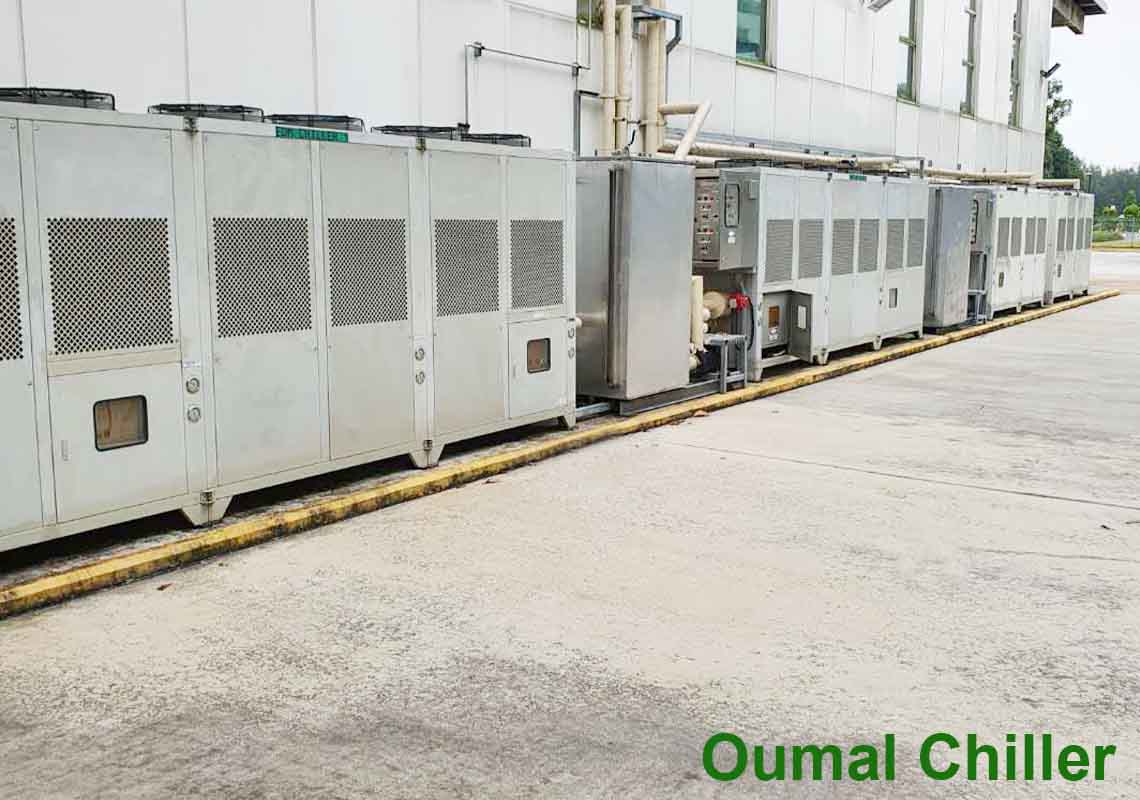It is inevitable that the chiller will produce sound when it is working. For example, when the fan rotates, the fan blades rub against the air, it will produce sound. Normal sound is allowed. However, even the sophisticated refrigeration equipment will appear after a long period of use. Fault. Then, the editor of Oumal Chiller will take you to understand the causes and solutions of the noise produced by the chiller.
First, find the reason from the parts that are easy to check and observe:
1. Are the anchor screws loose?
The chiller is fixed on the ground. After running for a long time, the anchor bolts will be loose, and the chiller will be unstable, which will cause noise. This situation can be solved by replacing the anchor bolts, and vibration reduction can also be installed if conditions permit. The purpose is to make the chiller firmly fixed on the ground.
2. Whether the connecting pipeline is firm
There are large and small pipes on the chiller, connecting the chiller, cooling equipment and other auxiliary devices. If the connecting screws are loose, noise will be generated after operation. The solution is to fix the pipes and equipment.
3. Is there any problem with the fan?
The air-cooled chiller is equipped with a fan fan, which is composed of a fan cover and blades. The blades are deformed by external force and will generate noise after rotating. The fan cover will also cause noise due to the entry of dust and debris. Replace the blades and regularly clean the top of the fan. Sundries can reduce noise.
Then we observe whether the following parts have abnormal noise:
4. Whether the water pump makes abnormal noise
The reason for the abnormal noise of the water pump is mostly due to the water quality, which is not clean enough, which causes the water pump pipe to be blocked, causing abnormal noise at work and generating noise. The circulating water needs to be treated to meet the requirements of the chiller.
5. Whether the compressor has abnormal noise
Compressor abnormal noise is a relatively important problem. Because the compressor is the "heart" of the chiller, special attention should be paid to abnormal noise. The main reasons for compressor abnormal noise are as follows:
Reason 1: Liquid refrigerant enters the compressor
Once the liquid refrigerant enters the compressor, because it cannot be compressed, the hydraulic pressure will cause liquid shock to the internal structure, resulting in vibration or noise. In addition, too much refrigerant will dilute the refrigerating oil and cause wear of mechanical parts.
Solution: Check whether there is too much refrigerant, and release excess refrigerant; check the opening of the expansion valve, whether it is too large, and adjust it in due course.
Reason 2: Excessive refrigerant oil causes liquid shock
Solution: Check the condition of the refrigerating oil in the compressor and adjust it to an appropriate amount.
Reason three: abnormal noise of compressor cylinder and crankshaft
Generally, it is caused by the lack of lubricating oil, causing abnormal wear of the internal components of the compressor, causing abnormal noise, and also affecting the operation of the compressor and reducing the service life of the equipment.
When this happens, the compressor needs to be repaired or replaced. It is worth noting that regular inspections of the chiller and compressor condition can effectively avoid this situation.
Some people in the industry have encountered this situation. Due to the poor return of oil in the oil return pipe and the lack of refrigerating oil, the compressor crank sleeve is damaged, which generates louder noise and aggravates wear.
It is normal for a chiller in normal use to have a little sound, but irregular and sudden noises must arouse our attention. Briefly summarize the following reasons for the noise of the chiller: loose connection screws, abnormal noises of fans, fans, and water pumps. , Excessive refrigerant, excessive refrigerating oil.

评论
发表评论